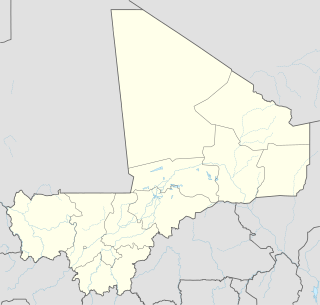Ousmane Issoufi Maïga was the Prime Minister of Mali from 2004 to 2007. Issoufi had previously held several ministerial posts in previous governments.
The National Congress for Democratic Initiative is a political party in Mali, founded in 1990 and led by Mountaga Tall.
Mountaga Tall is a Malian politician who is President of the National Congress for Democratic Initiative (CNID) and served in the government of Mali as Minister of Higher Education and Scientific Research from 2014 to 2016 and Minister of the Digital Economy and Communication from 2016 to 2017. Previously he was First Vice-President of the National Assembly of Mali from 2002 to 2007.
Tiébilé Dramé is a Malian politician who served in the government of Mali as Minister of Foreign Affairs from 1991 to 1992. In the years since he has remained active on the political scene, while also acting as a diplomat and mediator in regional crises.

Soumaïla Cissé is a Malian politician who served in the government of Mali as Minister of Finance from 1993 to 2000. He thrice stood unsuccessfully as a presidential candidate, in 2002, 2013 and 2018; on both occasions he was defeated in a second round of voting. Since 2014 he has been President of the Union for the Republic and Democracy, a political party.
The Party for National Rebirth is a Malian political party, created in 1995 by activists from the National Congress for Democratic Initiative (CNID). The Party for National Rebirth is headed by Tiébilé Dramé, who ran for the presidency in 2002, gaining 4% of the votes, coming in fourth place. In February 2007, he was again nominated as the party's presidential candidate for the April 2007 presidential election, receiving third place and 3.04% of the vote.
African Solidarity for Democracy and Independence is a left-wing political party in Mali. It was founded by Cheick Oumar Sissoko and Oumar Mariko in 1996; Sissoko is the party's President and Mariko is its Secretary-General, the top post in the party. The party is Pan-Africanist in ideology, is affiliated internationally with the International Communist Seminar, a grouping organised by the Workers Party of Belgium, and is in part an outgrowth of the 1991 demonstrations against the military rule of President Moussa Traoré. Mariko was head of the Association of Students and Pupils of Mali (AEEM) during the 1991 protest movement which overthrew the government.
The Union for the Republic and Democracy is a political party in Mali, led by Soumaïla Cissé.

Presidential elections were held in Mali on 29 April 2007. Incumbent president Amadou Toumani Touré ran for re-election against seven other candidates and won in the first round with about 71% of the vote.
Younoussi Touré is a Malian politician. He was Prime Minister of Mali from 9 June 1992 to 12 April 1993 and was the first Prime Minister appointed under President Alpha Oumar Konaré. Touré was the President of the Union for the Republic and Democracy (URD), a political party, from 2003 to 2014. He was First Vice-President of the National Assembly from 2007 to 2012 and President of the National Assembly from 2012 to 2013.
The Front for Democracy and the Republic is an opposition coalition in Mali that fought the presidential election on 29 April 2007 and the parliamentary election of 1 July and 22 July 2007. The FDR is an umbrella organisation, bringing together 16 independent political parties and groups. It rejected the official results of the election, according to which incumbent president Amadou Toumani Touré won with about 71% of the vote, and alleged fraud, unsuccessfully asking the Constitutional Court to annul the election. On 19 May, the leading FDR candidate, National Assembly president Ibrahim Boubacar Kéita, said that the group would abide by the court's decision to confirm Touré's victory and would concentrate on the July 2007 parliamentary election.
Mamadou Lamine Traoré was a Malian politician and President of the Movement for the Independence, Renaissance, and Integration of Africa (MIRIA) political party.

Dioncounda Traoré is a Malian politician who was President of Mali in an interim capacity from April 2012 to September 2013. Previously he was President of the National Assembly of Mali from 2007 to 2012, and he served as Minister of Foreign Affairs from 1994 to 1997. He was President of the Alliance for Democracy in Mali-African Party for Solidarity and Justice (ADEMA-PASJ) beginning in 2000, and he was also President of the Alliance for Democracy and Progress (ADP), an alliance of parties that supported the re-election of President Amadou Toumani Touré in 2007.
The Movement for the Independence, Renaissance, and Integration of Africa is a political party in Mali.
The Malian Party of Labour is a Marxist-Leninist party in Mali and a member of the coalition supporting the Alliance for Democracy in Mali of president Amadou Toumani Touré. Founded in 1965, it was prominent in the student resistance to the 1968-1991 military regime of General Moussa Traoré. It continues as an extra-parliamentary Hoxhaist-Communist faction within the Social-Democratic ADEMA-PASJ coalition, supporters of the Alliance for Democracy and Progress.

Presidential elections were held in Mali on 28 July 2013, with a second round run-off held on 11 August. Ibrahim Boubacar Keïta defeated Soumaïla Cissé in the run-off to become the new President of Mali.









